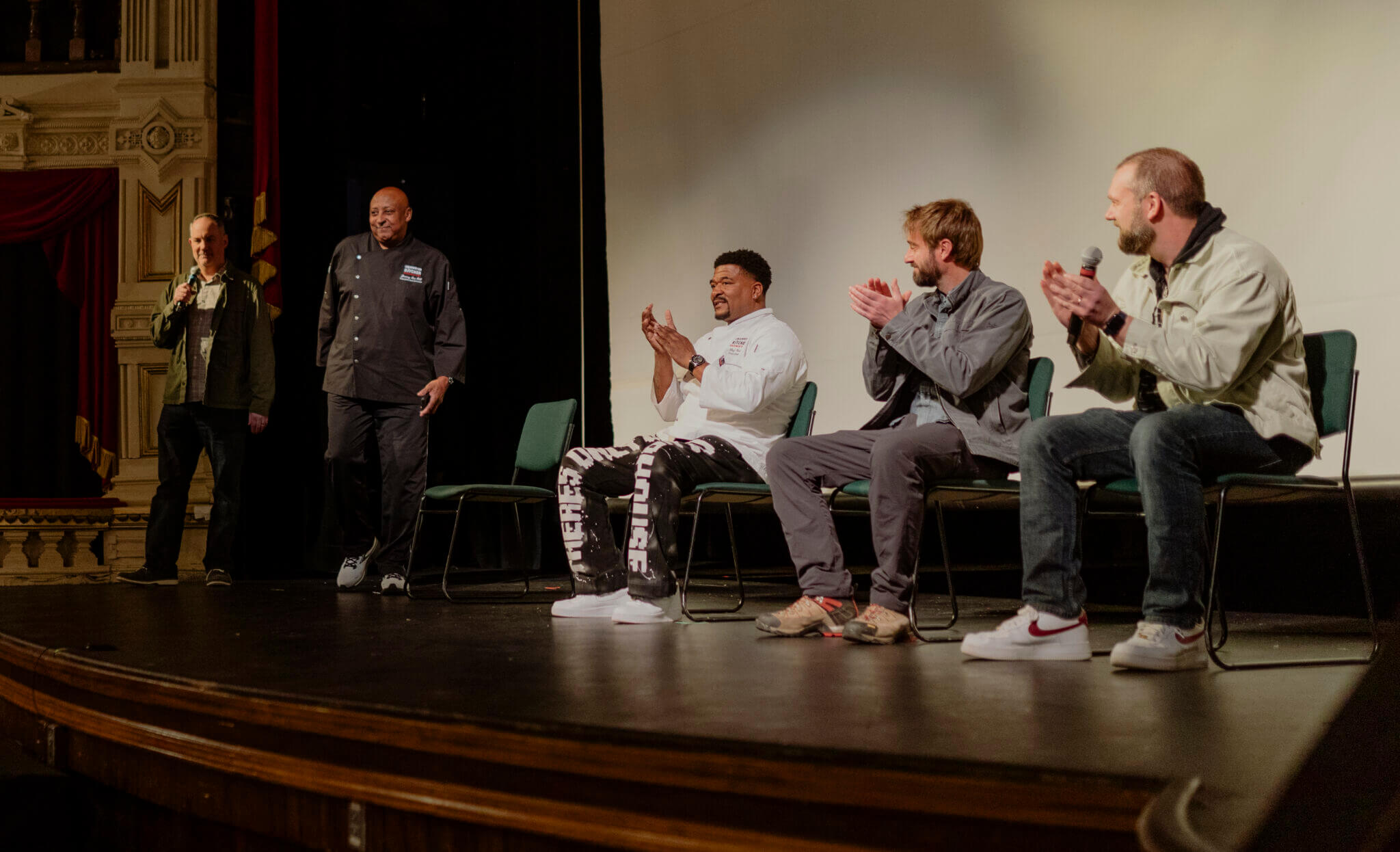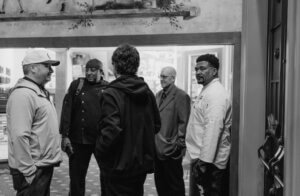
This story is featured in the Michigan Justice Fund’s 2023 Annual Report.
The criminal legal system – which touches one out of three Americans – can be shifted by reforming policies, re-investing in communities and social services, and stimulating creative solutions to social challenges, public health crises, and poverty.
The Michigan Justice Fund is proud to be a supporter of the Coldwater Kitchen film through our grantmaking program. Since the film’s debut in 2022, the documentary has received the coveted James Beard Foundation Award, honoring its innovative approach to addressing mass incarceration and prison reform through the lens of culinary arts and film.
Executive Producer Desiré Vincent Levy and Co-Director Mark Kurlyandchik are leading efforts to bring Coldwater Kitchen into communities through a national advocacy campaign that amplifies the voices and experiences of individuals and families impacted by incarceration. We spoke with Desiré, Mark, and Food Tech Program Alumnus Chef Dink about the impact of Coldwater Kitchen and shifting the narrative surrounding those directly impacted by incarceration.
MJF Program Communications Officer Briana Mitchell interviewed Desiré Vincent Levy, Mark Kurlyandchik, and Chef Dink to learn more about their personal journeys in the making of the film and the impact of their stories.
BM: How big of a role does the media play in portraying the experiences of those impacted by incarceration?
MK: Part of the function of the carceral system is to dehumanize people who come through it. You hear it in the first five minutes of the film. One of the men talks about how coming into prison begins this process of dehumanization and that through this culinary program, they were able to express their full humanity. I think the system itself aims to dehumanize because when you stop, sit back, and think about what we do to other humans. We lock them up and create all the other barriers that then come with that, from the quality or the lack of nutrition that they get fed while they are locked up.
The media has a huge role to play, because our conceptions of what happens in prison, who is in prison, and what they are in prison for come entirely from the media. They’re not really telling the story in a way that gives scrutiny. You have to have somebody who’s scrutinizing this system and the system hasn’t made it easy for scrutiny.
I’ve since left the Detroit Free Press to pursue documentary work, because I found that the media is often deferential to historical authority figures and systems of power. That includes taking the police’s stance versus anybody else’s stance in a given situation. I think the Free Press has done a great job of covering the prison system. Without an institution like the Free Press to do that, we wouldn’t know about a lot of the things that are going on inside. But the system itself doesn’t make it easy.
BM: What is the biggest misconception about people who have been impacted by incarceration?
DS: Thinking they are the worst of the worst. When someone knows that a person has been convicted of a felony but not what they were convicted of, they can jump to the worst assumptions. So it’s easy to see that box and have a preconceived notion of what a person did just by that box. Don’t be so quick to judge if you don’t know the person.
BM: How does telling this story through the lens of film help amplify the need for criminal legal reform in Michigan?
DV: Film to me, especially Coldwater Kitchen and how it’s presented, really gives an opportunity for people to connect with it mentally and emotionally in a way that an article might not. It’s tangible in that you can feel and see people in ways that other types of media don’t. That’s one of the most powerful aspects of it. If you have the opportunity to be a part of an event where you see the film and also have a meal, that adds a layer to that experience that touches on all of the senses. It provides the opportunity to fully engage an audience in a way that just presenting facts, figures, and information does not. Obviously, data is important, but sometimes we need to take a step back so that people understand that attached to and before statistics are people, and people just like you and I that have stories that are worthy of knowing
BM: How does incorporating food transcend the experience of digesting Coldwater Kitchen?
DV: Food is a universal language because we all have to eat. We all have our own cultures around food. To me, food makes the experience of understanding the issue more approachable because we know it. We nourish ourselves. We celebrate. We mourn. We do a lot of things with food. I think food adds a layer to make people ready and more open to receive and also be connected in community, which is important when you’re considering issues like incarceration or other social issues.
BM: How has building relationships with the Coldwater Kitchen team impacted your life?
DS: It has been beautiful. I just got back from California with Mark and Brian. They had me swimming in the Pacific Ocean – it’s 40 degrees, you know what I’m saying? We have a bond, and when we get together, we enjoy each other’s company. This is change. The people that are in your circle. That knowledge that you can achieve something different from what you’re accustomed to, and the support to help you do it. It’s beautiful. It’s a beautiful relationship across the board, and I’m just thankful to be a part of it.

BM: How has your relationship with the Chefs impacted your life and what have you learned from them?
MS: If you ask Dink the same question, he’s going to tell you “we family now,” because that’s what he says about us, and I agree. Since the day I stepped into that classroom for the first time, it has been almost a six-year journey. It was challenging at first, especially because journalism teaches you to be removed from your subject. You’re not supposed to develop intimate relationships with them. You write your story from this objective perspective and move on. This is one of the reasons that I’ve been so drawn to documentaries, because I’m a relationship person. I love people and understanding them on a deeper level — what links us all, what binds us all. The documentary is the process to sort of understand these things better. Recently, Jimmy Hill and I were in Milwaukee for a film festival, and he has a lot of family there. I was invited into his cousin’s house, and there were great aunties and cousins, friends… The whole family was there, and they cooked, and here I am. The only reason I’m in that space is because of my relationship with Jimmy. That’s because of this film. Even in Detroit too, after Dink’s welcome-back party, he’s taking me to places that I would have never seen because of my background and who I am. That has enriched my world in such a way and made it so much more vibrant and bright, just from a purely selfish standpoint.
Brad is still in prison, and his parole got pushed back. Brian and I are going to visit him in a couple of weeks just to rap and hang out and be shoulders for him and support him. I wrote a letter on his behalf to the parole board. We’re all family now in a way and waiting for everyone to be together again.
BM: What has this experience taught you?
DS: Anything is possible. We just won the James Beard Award last year. I was part of Team Detroit in South Carolina, where we won best Food City. That started with Ernest writing a letter to Mark. And here we are. Now we’re traveling all over the world for food. This is amazing.
BM: What’s next for Coldwater Kitchen? I know there are talks to amplify this film through a national campaign. Can you talk about that campaign and how you plan to introduce this film to a broader audience?
DV: We are in phase two of the project. Phase one was the festival circuit. We premiered in 2022 at Doc NYC. In phase two, we’re going into our impact and community engagement campaign, which means we’re going to be taking the film on a national tour, where we’ll screen the film and have dinner prepared by the chefs. If not by the chefs from Coldwater Kitchen, then by chefs in the communities that we’re in who have similar stories or who are mission aligned. It’s also an opportunity to lift up their experiences. It’s important to take it national because, even though this is a Michigan story, the experience of incarceration is not unique to Michigan. Having the opportunity to thread cohesiveness and community and use the film as a jumping-off point to do that feels like an important aspect of this work.
BM: What are your hopes for the future?
DS: I want to put my food on a plate instead of in these boxes I’ve been using for the last four years. I want to own a sit-down restaurant or maybe move towards becoming a private chef. As far as Coldwater Kitchen, we want an Oscar.
Ultimately, I hope that the people with power see the film. I want them to notice the program and see what they can use in the curriculum in the other programs out there. There are 10 additional food tech programs, but they are not being operated the way Chef Hill leads his program.
BM: What do you hope viewers take away from this film?
DV: I want them to understand that incarceration is not as far away from them as they think it is. We have community members all around us that have this lived experience. They’re coming home, and we all need to be reflective and active on how we can change the way the criminal legal system operates. That’s a big job. But what we can do is think about how we are active and engaged in our communities to receive and best support people returning home. That could look like talking to your elected officials about the types of opportunities and programs there are to support returning people so that there isn’t recidivism. Right now, our system is not designed to support successful reentry. It’s happening all around us, even if we’re not keenly aware of it. We have community members, people who we see, people who we work alongside that have this experience, and I think that we need to generally have a better understanding as a culture and then also be more active in our own communities.
To learn more about Coldwater Kitchen, CLICK HERE.

